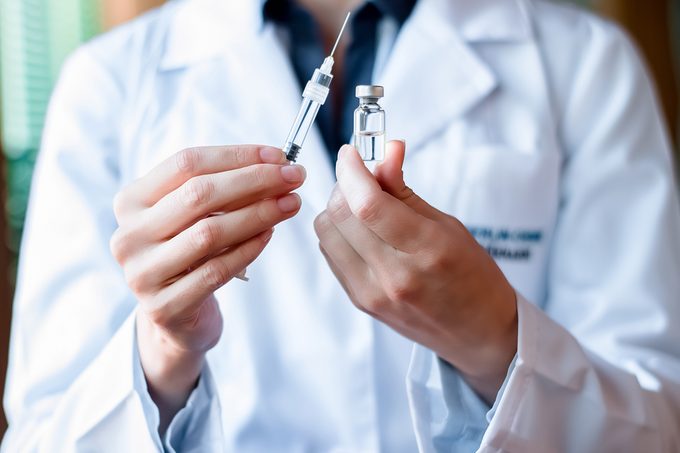I Got HPV at Age 53—Here’s What I Wish I’d Known Earlier
Updated: Oct. 15, 2020
After being newly divorced, Sue Linden (not her real name) was thrilled to have sex again. However, she soon learned she had an HPV infection at age 53.

Editor’s note: The name of the writer has been changed to protect the privacy of the individual.
After years in a sexless marriage (too embarrassingly many to mention), I was, at 53 and newly divorced, thrilled to be having sex again—with a younger hot guy no less. The truth is, it wasn’t so easy getting back into the swing of things. I was post-menopausal and needed vaginal estrogen and patience to bring that part of my body back to life, a process that was sometimes uncomfortable and often awkward. But all the kinks had been worked out and we were finally enjoying sex, until I got a call from my gynecologist’s nurse a few days after my annual visit. “Your HPV test is positive,” she said on the phone. “But you tested negative for the types with a high risk of cancer.” I was stunned and stammered out a few panicky questions before I hung up.
How could I have escaped STIs in my carefree and sexually active 20s and 30s, only to get the potentially cancerous, genital wart-causing human papillomavirus (HPV) in my wise older age? Well, the answer, quite simply, was unprotected sex. My young stud said he was disease-free, but unbeknownst to him and me (an award-winning health journalist, so yeah, I should have known), there’s no routine test for HPV in men. And remember that difficult phase of bringing my vagina back to life? Well condoms complicated things, so since I was not at risk of getting pregnant, we skipped them, stupidly.
I didn’t know much about HPV, as it didn’t seem like a big concern back in the 80s and 90s, when I was single, and my teenage kids have been vaccinated, so I wasn’t concerned for them. Here’s what I wish I knew when I jumped back into the dating world.
You can’t see it, feel it, or test for it, in men

There are more than 40 different types of HPV that can be spread through sexual contact and only a few of those cause warts, and not everyone who gets those warty types actually get warts. The Centers for Disease Control and Prevention (CDC) estimates 79 million Americans have HPV and the vast majority have no symptoms and don’t know they’re carriers. There’s no way for a man to know he has it because there’s no commercially available test for men, though women can be tested during an annual Pap test. Because it can show up years after you’ve been infected, it makes it difficult to know who may have passed it onto you. (Now you can avoid not knowing with at-home STD test subscriptions.)
How do you get it?
By age 50, at least 4 out of 5 women will have been infected with HPV at some point in their lives, the CDC reports. HPV only infects skin cells, and is most commonly spread through skin to skin contact during vaginal, anal, or oral sex. “HPV just infects the lowest or basal layer of skin cells,” says J. Dennis Fortenberry, MD, MS, chief, division of adolescent medicine at Indiana University School of Medicine in Indianapolis. “As these lower layers move toward the outermost skin layer, they are naturally shed, and HPV can be transmitted through those shed cells.” Infected cells, though, are picked up and shuttled along by vaginal fluids, which is how these fluids transmit the virus. It appears to be rare to catch HPV through kissing, though.
How do you prevent getting HPV?
The best way to avoid getting HPV is to use condoms, though this may not prevent it entirely because HPV can infect other areas not covered by the condom. The CDC strongly recommends vaccination against HPV in teens and young adults up to age 26. For women between 26 and 45, the CDC suggests discussing vaccination with your doctor and basing it on your individual sexual history and future. The agency does not recommend it after age 45 because most people have already been exposed by then. However, a woman in her 40s or 50s who had little exposure earlier in life and is or plans to have sex with multiple partners may want to get vaccinated.
Will I get genital warts?
Many people infected with HPV will not get genital warts because only a few types cause them. Of the 79 million Americans with HPV, roughly 350,000 (less than 1 percent) have genital warts. That’s why most people don’t know they have it. HPV types that cause genital warts do not typically cause cancer. (Here’s how one woman found our her “menopause” symptoms were actually due to cervical cancer.)
What’s the cancer risk?
Almost all cases of cervical cancer are associated with HPV, but the vast majority of women with HPV will not get cancer. There are 14 high-risk types of HPV that can cause cancer, but two types—types 16 and 18—account for about 66 percent of cervical cancers in the U.S, according to the National Cancer Institute. Though most women with HPV clear the infection within two years, about 10 percent of women will develop chronic HPV infections that can lead to cellular changes that put them at increased risk for cervical cancer. But because it can take 15 to 20 years for cervical cancer to develop in women with healthy immune systems, most cancers are caught in precancerous stages by regular pap tests and don’t progress to cancer. “If a woman gets a new HPV infection when she’s 50, chances of getting cancer are probably less than if she gets it in her 20s,” says Joel Palefsky, MD, professor, department of infectious diseases at University of California, San Francisco. HPV is also associated with other cancers, including (in order of prevalence), cancers of the throat (much more common in men), anus, vulva, penis, and vagina. (Here are 7 cervical cancer risks every woman should know.)
Will I have HPV forever?
Usually, the body’s immune system gets rid of the HPV infection naturally within two years, though scientists are divided about whether HPV just goes dormant or is rid from the body. Studies, including one published in Cancer Research, suggest that HPV can return if a person’s immune system becomes compromised, suggesting that the virus is dormant. “The important thing to know is that if you do test negative, you are at very low risk of having any future problems with disease and at low risk of spreading the virus,” says Dr. Palefsky. About 10 percent of women with high-risk types of HPV cannot clear the virus from their system and have what’s described as a chronic infection.
Can I have sex with my partner again?
If you’re in a monogamous relationship and you test positive for HPV, chances are your partner has it as well. The question is, will you keep passing it back and forth, preventing either of you from clearing it from your bodies? “We think reinfections by the same HPV type is uncommon,” says Dr. Fortenberry. Experts don’t typically advise monogamous couples who have already had a lot of sexual contact to change their behavior (like start using condoms) if, for example, a woman tests positive for HPV. (Here are 10 Myths about HPV you need to stop believing.)













